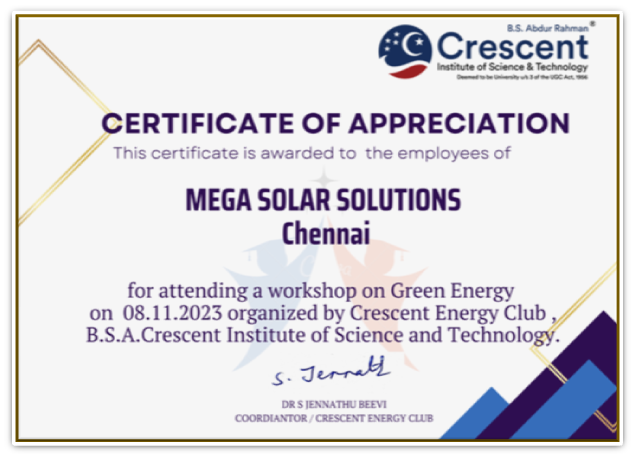Crescent Sustainability Initiatives
Affordable and Clean Energy (SDG 7)
The Crescent Energy Club at B.S. Abdur Rahman Crescent Institute of Science and Technology is dedicated to fostering a vibrant community focused on sustainable energy and environmental stewardship. With a mission to promote energy literacy and sustainability, the club provides a platform for knowledge sharing, networking, and collaboration among students, faculty, and professionals. The club’s motto emphasizes empowering members to lead the transition towards a clean energy system through various initiatives and activities.
The Crescent Energy Club has achieved significant recognition, including the Star Performer Award during the IGEN Green Day and participation in the Energathon 2023, where they contributed to a world record for continuous online events promoting sustainability. The club’s commitment to energy efficiency services for local industries includes conducting assessments, workshops, and research on renewable energy options, aiming to empower the community and drive positive change.

Figure VII (4.3) – 1 : Certificate for the Employers of M/s. Jayam Engineering Services, Chennai

Figure VII (4.3) – 1 : Certificate for the Employers of M/s. Mega Solar Solutions, Chennai
The Certificate of Appreciation awarded to M/s. Jayam Engineering Services, located in Karapakkam, Chennai and M/s. Mega Solar Solutions, Chennai , recognizes the dedication and participation of its employees in a “Workshop on Green Energy”. Conducted on November 8, 2023, by the Crescent Energy Club at the B.S. Abdur Rahman Crescent Institute of Science and Technology, this initiative represents a crucial intersection between academic expertise and local industry needs.
This certificate not only highlights the employees’ commitment to enhancing their knowledge on renewable energy solutions but also serves as a testament to the direct services provided to local industries aimed at improving energy efficiency. The workshop included assessments of energy efficiency practices, strategies for implementing sustainable energy solutions, and discussions on research into renewable energy options. Such initiatives empower industries to transition towards cleaner energy sources, which is vital for achieving broader environmental and sustainability goals.
Dr. S. Jennathu Beevi, the Coordinator of the Crescent Energy Club, the certificate underscores the collaborative approach between educational institutions and industry players. By empowering local industries with practical knowledge and resources, the workshop contributes significantly to the ongoing dialogue on energy efficiency and cleaner energy practices. This alignment with industry needs not only enhances operational efficiencies but also solidifies a shared commitment to sustainable development in the region.
Table VII (4.3) – 1: Attendance details of the Participants
No. | Name | Designation | Organization |
1 | Ram Mohan N. | Engineer | Mega Solar Solutions |
2 | Suryakala S | Technician | Mega Solar Solutions |
3 | Aravind M. | Project Manager | Mega Solar Solutions |
4 | Sagar Krishna M. | Research Analyst | Mega Solar Solutions |
5 | Thiagarajan S | Engineer | Mega Solar Solutions |
6 | Manivannan R | Consultant | Mega Solar Solutions |
7 | Abdul Samath R | Operations Manager | Mega Solar Solutions |
8 | Rani Malliga R. | Quality Assurance | Mega Solar Solutions |
9 | K. Soundarya | Engineer | Mega Solar Solutions |
10 | Thulasi Narayanan | Environmental Scientist | Mega Solar Solutions |
11 | Ahamed Khan | Supervisor | Mega Solar Solutions |
12 | Chandrika K. | Sales Executive | Mega Solar Solutions |
13 | R. Kannan | Renewable Energy Specialist | Mega Solar Solutions |
14 | Selvam A. | Energy Analyst | Mega Solar Solutions |
15 | Manigandan P | Business Development | Mega Solar Solutions |
16 | Shahin M. | Marketing Executive | Mega Solar Solutions |
17 | Shailaja R | Technician | Mega Solar Solutions |
18 | Vani P. | Project Coordinator | Mega Solar Solutions |
19 | Rajnisha | Business Development | Jayam Engineering Services |
20 | Kannabiran | Engineer | Jayam Engineering Services |
21 | Pandiyan | Engineer | Jayam Engineering Services |
22 | Kamalanathan | Project Coordinator | Jayam Engineering Services |
23 | Roopa | Technician | Jayam Engineering Services |
24 | Ravi Kumar | Technician | Jayam Engineering Services |
25 | Farook Ahamed | Supervisor | Jayam Engineering Services |
26 | Devendiran | Engineer | Jayam Engineering Services |
27 | Priya N. | Engineer | Jayam Engineering Services |
28 | Radhakrishnan | Technician | Jayam Engineering Services |
29 | Goutham Raj | Project coordinator | Jayam Engineering Services |
30 | Mani | Technician | Jayam Engineering Services |
Testimonials from Workshop Participants : (Sample)
- Sagar Krishan : “The workshop was incredibly enlightening! The insights on renewable energy technologies were eye-opening and will definitely influence our future projects.”
- Pandiyan : “I appreciated the hands-on approach and the practical examples shared during the sessions. It motivated us to integrate more sustainable practices into our work.”
- Ahamed Khan : “The knowledge shared about energy efficiency assessments was invaluable. I feel better equipped to make recommendations that could save our company costs while being environmentally responsible.”
- Goutham Raj : “This workshop transformed my understanding of clean energy solutions. I am eager to implement what I’ve learned into our current projects.”
- Kannabiran : “Interacting with experts in the field made the learning experience enriching. The discussions sparked new ideas for potential collaborations on renewable energy initiatives.”
- Vani : “I found the energy efficiency strategies particularly useful. I am confident that we can apply these concepts to improve our operational efficiency moving forward.”
- Shailaja : “The workshop provided comprehensive knowledge about the latest trends in green energy. I am excited to share this information with my team.”
- Chandrika : “It was inspiring to be in a room filled with like-minded professionals. The networking opportunities were a great bonus.”
POLICY FOR ENERGY-EFFICIENT RENOVATION AND BUILDING
Issue: 04; Revised on 2023
| Policy Created on | July 2009 |
| 1st Revision amended on | IQAC Meeting held on 27th October 2017 |
| 2nd Revision amended on | IQAC Meeting held on 31st March 2021 |
| 3rd Revision amended on | IQAC Meeting held on 16th June 2023 |
Responsible Executive : Director (IQAC)
Responsible Office : Internal Quality Assurance Cell, Estate Office, and SDG Cell
Contacts : Registrar, Director (IQAC)
The B.S. Abdur Rahman Crescent Institute of Science and Technology is committed to ensuring that all renovations and new constructions on campus adhere to stringent energy efficiency standards. This policy aims to:
- Ensure universal access to affordable, reliable, modern energy services.
- Increase substantially the share of renewable energy in the global energy mix.
- Double the global rate of improvement in energy efficiency
- Enhance international cooperation to facilitate access to clean energy research and technology.
- Expand infrastructure and upgrade technology to supply modern and sustainable energy services, particularly in developing countries.
7.2 REASON FOR THIS POLICY
This policy is established to promote energy-efficient practices in renovating existing infrastructures and constructing new buildings. By adhering to energy efficiency standards, the Institute aims to reduce greenhouse gas emissions, lower operational costs, and contribute to the global efforts to combat climate change, which aligns with SDG 7 – Affordable and Clean Energy.
7.3 RESPONSIBILITIES
7.3.1 Policy Principles
The Institute shall implement the following principles to ensure compliance with energy efficiency standards:
- All renovations and new constructions must achieve recognised building rating systems such as EDGE, IGBC, and LEED.
- Sustainable design features, including using renewable energy sources, shall be integrated into all projects.
- An efficient waste management plan shall be established to minimize waste and promote recycling.
- Rainwater harvesting systems shall be implemented in all new buildings.
- Energy conservation shall be prioritized through the installation of energy-efficient appliances and equipment.
- Regular audits of energy consumption shall be conducted to identify areas for improvement.
- Use of low VOC (Volatile Organic Compounds) materials in construction and renovation to minimize harmful emissions.
- Adoption of eco-friendly housekeeping practices using biodegradable chemicals.
- Implementation of high reflective roofing materials and green roofs to reduce heat island effects.
- Encourage water-efficient landscaping and high-efficiency irrigation technology in new construction projects.
- Support R&D activities towards energy-efficient renovation and building.
- Enhance national/international cooperation to facilitate access to green building technology.
- Dissemination of Policy
- Awareness programs shall be conducted regularly for all stakeholders regarding energy-efficient practices.
- This policy shall be publicly accessible on the Institute’s website and updated as necessary.
7.3.3 Enforcement of Policy
- The Director (Planning and Development) and their team are responsible for monitoring compliance with this policy.
- Compliance shall be communicated to architects, design engineers, and construction workers involved in projects.
7.2.1 – ENERGY EFFICIENCY POLICY.pdf
POLICY FOR DIVESTMENT FROM CARBON-INTENSIVE ENERGY INDUSTRIES
Issue: 04; Revised on 2023
| Policy Created on | July 2009 |
| 1st Revision amended on | IQAC Meeting held on 27th October 2017 |
| 2nd Revision amended on | IQAC Meeting held on 31st March 2021 |
| 3rd Revision amended on | IQAC Meeting held on 16th June 2023 |
Responsible Executive: Director (IQAC)
Responsible Office: Internal Quality Assurance Cell, Estate Office, and SDG Cell
Contacts: Registrar, Director (IQAC)
The B.S. Abdur Rahman Crescent Institute of Science and Technology is committed to divesting from carbon-intensive energy industries, particularly coal and oil, to promote sustainable energy practices and contribute to the global efforts to combat climate change. This policy aims to:
- Ensure universal access to affordable, reliable, and modern energy services.
- Increase substantially the share of renewable energy in the global energy mix.
- Double the global rate of improvement in energy efficiency.
- Enhance international cooperation to facilitate access to clean energy research and technology.
- Promote investment in energy infrastructure and clean energy technology.
7.2 REASON FOR THIS POLICY
This policy is established to minimize the Institute’s carbon footprint by reducing investments in fossil fuels and promoting renewable energy sources. By divesting from carbon-intensive industries, the Institute aligns with the United Nations’ Sustainable Development Goals, particularly SDG 7: Affordable and Clean Energy, and supports the transition to a sustainable energy future.
7.3 RESPONSIBILITIES
7.3.1 Policy Principles
The Institute shall implement the following principles to ensure effective divestment from carbon-intensive energy industries:
- Conduct a comprehensive review of current investments to identify carbon-intensive assets.
- Gradually divest from all investments in coal and oil industries within a specified timeframe.
- Reallocate funds towards renewable energy projects and sustainable technologies.
- Collaborate with financial institutions that prioritize sustainable investment practices.
- Promote transparency in investment decisions and publicly report on divestment progress.
- Engage with stakeholders, including students and faculty, to raise awareness about the importance of divestment from fossil fuels.
- Support research and development initiatives focused on clean energy technologies.
7.3.2 Dissemination of Policy
- This policy shall be publicly accessible on the Institute’s website to ensure transparency.
- Awareness programs shall be conducted regularly for all stakeholders regarding the importance of divestment from carbon-intensive industries.
- Updates on divestment progress shall be communicated through newsletters and reports.
7.3.3 Enforcement of Policy
- The Director (Finance) and their team are responsible for monitoring compliance with this policy and reporting on divestment progress.
- Any breach of this policy may result in a review of investment strategies and potential disciplinary actions as prescribed by the Institute’s code of conduct.


